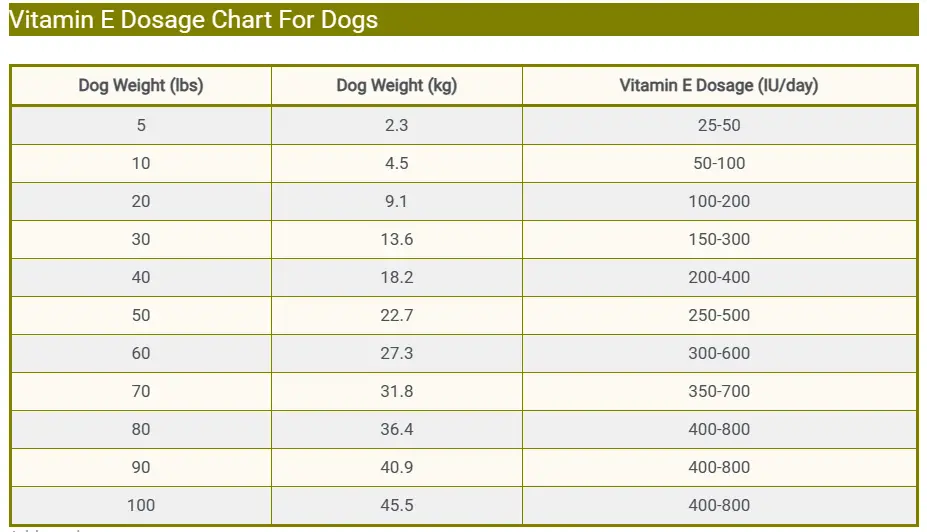The safe dosage of vitamin E depends on the size of the dog and its health condition. The recommended dose of vitamin E for toy to small dogs is 100 IUs daily, for medium-sized dogs it’s 200 IUs daily, for large dogs it’s 400 IUs daily, and for giant breeds, it can be up to 800 IUs daily.
Vitamin E Dosage For Dogs

-
Ideal Dose: 5 -10 IU/lb
-
Uses: Supports healthy skin and coat, alleviating dryness, itching, and flakiness.
-
FDA Approved: Yes
-
Variants: Capsule, Liquid
-
Storage & Handling: Room Temperature
-
Administration: Once Daily
Disclaimer: Self-medication can be hazardous. Please consult your veterinarian for personalized guidance on the appropriate dosage for your furry friend’s specific condition.
As devoted pet owners, ensuring the well-being of our furry friends is paramount. Just as we carefully consider our own nutritional needs, it’s equally important to address the dietary requirements of our canine companions.
Among the nutrients vital for their health, Vitamin E is a key player, offering many benefits ranging from bolstering immune function to promoting skin and coat health. However, determining the appropriate dosage for your dog can be daunting, especially considering factors such as size and health condition.
In this insightful guide, we unravel the intricacies of Vitamin E dosage for dogs, equipping you with the knowledge needed to provide optimal care for your beloved four-legged family member.
Vitamin E Dosage For Dogs
The appropriate dosage of vitamin E for dogs can vary depending on size, age, and health condition. It’s always best to consult with a veterinarian before giving any supplements to your dog.
The recommended dosage of vitamin E for dogs is typically around 5 to 10 international units (IU) per pound of body weight per day. This can vary slightly based on individual circumstances, so it’s crucial to seek advice from a professional to determine the right dosage for your furry friend.
Giving too much vitamin E can lead to health issues, so it’s important to follow the guidance of a veterinarian.
Vitamin E Dosage Chart For Dogs
| Dog Weight (lbs) | Dog Weight (kg) | Vitamin E Dosage (IU/day) |
|---|---|---|
| 5 | 2.3 | 25-50 |
| 10 | 4.5 | 50-100 |
| 20 | 9.1 | 100-200 |
| 30 | 13.6 | 150-300 |
| 40 | 18.2 | 200-400 |
| 50 | 22.7 | 250-500 |
| 60 | 27.3 | 300-600 |
| 70 | 31.8 | 350-700 |
| 80 | 36.4 | 400-800 |
| 90 | 40.9 | 400-800 |
| 100 | 45.5 | 400-800 |
Related Post: Dramamine Dosage For Dogs
Uses
-
Provides antioxidant protection, reducing oxidative stress and promoting overall health.
-
Supports healthy skin and coat, alleviating dryness, itching, and flakiness.
-
Boosts immune function, aiding in fighting off infections and illnesses.
-
Offers anti-inflammatory properties, benefiting dogs with arthritis or joint issues.
-
Supports reproductive health, particularly in breeding females and males.
-
May promote cardiovascular health by maintaining healthy blood circulation.
-
Essential for proper neurological function, supporting brain health and cognitive function in aging dogs.
Related Post: Safe-Guard® Dosage For Dogs
Potential Side Effects
-
Gastrointestinal upset: including diarrhea, vomiting, or stomach discomfort.
-
Interference with blood clotting: leading to an increased risk of bleeding.
-
Vitamin toxicity: rare but possible with excessive intake, causing symptoms like weakness or liver problems.
-
Interactions with medications: potentially affecting the effectiveness of certain drugs, particularly anticoagulants.
-
Allergic reactions: such as itching, hives, or difficulty breathing in sensitive dogs.
Which Dogs Should Not Take Vitamin E
Canines with the following health issues should not take Vitamin E without veterinary recommendations.
-
Dogs with specific health conditions, such as clotting disorders or liver disease.
-
Dogs on certain medications, particularly anticoagulants or blood thinners.
-
Dogs with known allergies or sensitivities to vitamin E or other supplement ingredients.
-
Pregnant or nursing dogs, who should only take vitamin E under veterinary guidance to ensure safety for both the mother and her puppies.




![Can Dogs Eat Blood? 7 Side Effects [Expert Opinion]](https://petskor.com/wp-content/uploads/2022/04/Webp.net-resizeimage-12.jpg)
